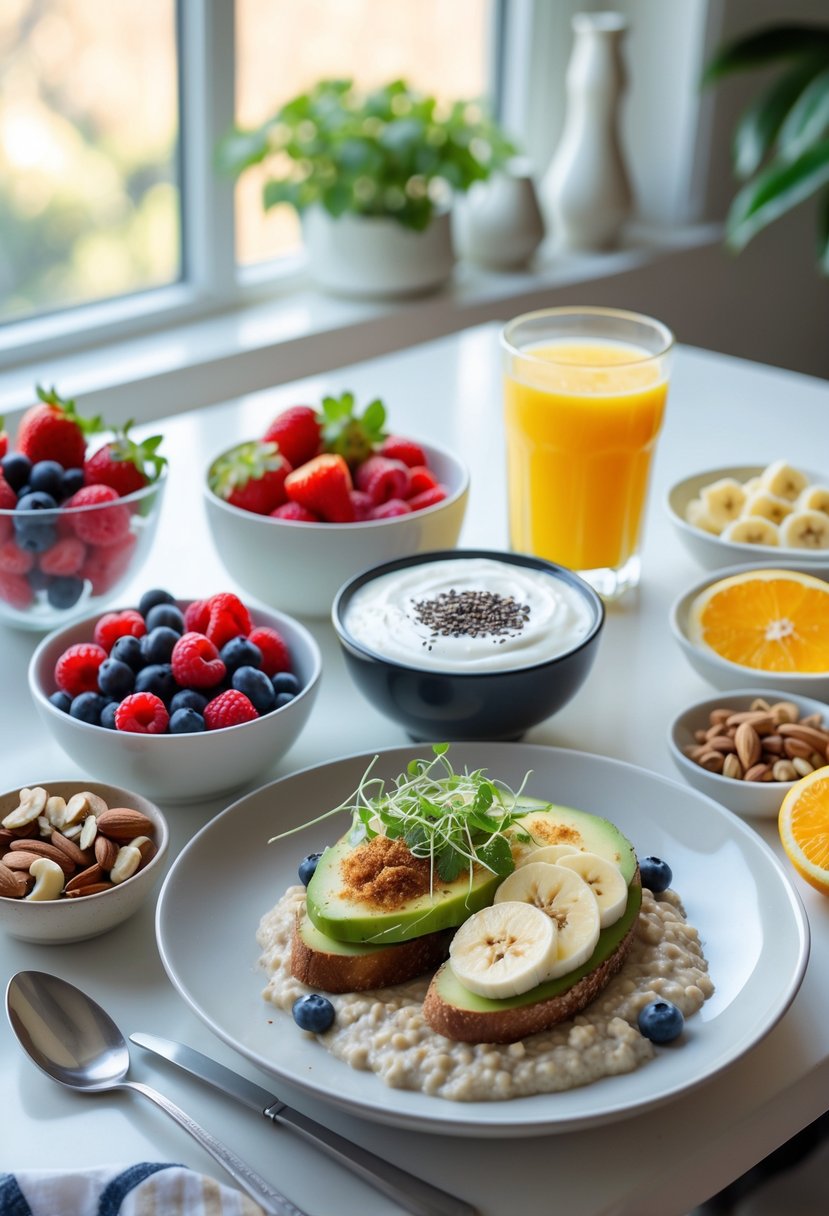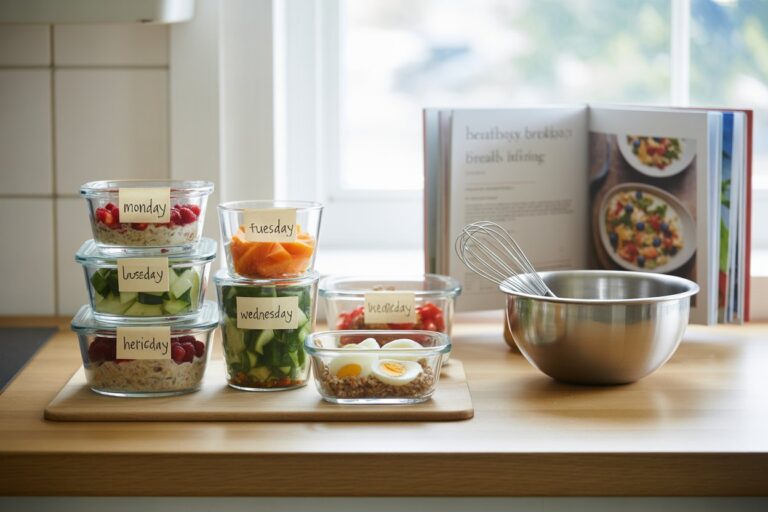What To Eat For Breakfast: Healthy Choices And Energizing Meals
Breakfast is a key meal that can set the tone for the entire day. A healthy breakfast should include protein, fiber, and nutrients to keep you full and energized until your next meal. Foods like eggs, whole grains, fruits, and yogurt offer the right balance to support energy and focus.

Choosing nutrient-dense options helps avoid quick energy crashes and unnecessary snacking later. Simple, wholesome breakfasts such as oatmeal with fruit, Greek yogurt with nuts, or whole grain toast with avocado provide lasting fullness and important vitamins.
Knowing what to eat can make mornings easier and healthier. With a few smart choices, breakfast can become a satisfying and nutritious start to the day that supports overall well-being.
Key Takeaways
- A balanced breakfast should combine protein and fiber for lasting energy.
- Whole foods like eggs, fruit, and whole grains support fullness and nutrients.
- Simple, nutrient-rich breakfasts help prevent unhealthy snacking later.
Building a Balanced Breakfast

A balanced breakfast provides nutrients that fuel the body and mind, helping to regulate energy and maintain health. Key elements include protein, fiber, healthy fats, and important vitamins and minerals essential for body functions.
Essential Nutrients for the Morning
Important nutrients for breakfast include calcium, iron, B vitamins, and antioxidants. Calcium supports bone health, while iron helps carry oxygen in the blood. B vitamins aid in energy production and brain function.
Antioxidants protect cells from damage and support heart health. Foods like eggs, Greek yogurt, fruits, and whole grains offer these nutrients. Choosing whole, nutrient-dense foods avoids added sugars and refined carbs found in many breakfast products.
Getting a variety of these nutrients at breakfast helps maintain stable glucose levels. This keeps energy steady and reduces mid-morning hunger or blood sugar spikes that can lead to fatigue.
Role of Protein and Fiber
Protein and fiber are crucial for feeling full and maintaining energy. Protein sources such as eggs, Greek yogurt, and nuts support muscle health and brain function.
Fiber, found in whole grains, fruits, and seeds, slows digestion and helps control blood sugar levels. It also promotes heart health by lowering cholesterol.
A breakfast with both protein and fiber helps reduce cravings later in the day by increasing satiety. For example, oatmeal paired with nuts or berries creates a balanced meal that keeps hunger at bay and supports steady energy.
Healthy Fats and Their Importance
Healthy fats, including omega-3 and monounsaturated fats, play a key role in heart and brain health. Foods like nuts, seeds, avocado, and olive oil provide these fats.
Monounsaturated fats help lower bad cholesterol and reduce inflammation, which can lower heart disease risk. Omega-3 fats support brain function and may have anti-inflammatory effects.
Including healthy fats in breakfast alongside protein and fiber can improve nutrient absorption and maintain longer-lasting energy. Eating balanced fats prevents quick blood sugar rises and supports overall wellbeing.
Top Healthy Breakfast Foods

Choosing breakfast foods rich in protein, fiber, and nutrients supports energy and fullness throughout the morning. Foods like eggs, oatmeal, yogurt, and whole grains provide essential vitamins and minerals while helping control hunger.
Eggs and Their Benefits
Eggs are a strong protein source that helps keep people full longer. They contain nutrients like choline, which supports brain and liver health, as well as antioxidants like lutein and zeaxanthin that may protect eyes.
Despite concerns about cholesterol, studies show eggs don’t raise cholesterol levels in most people. Eating eggs with whole grain toast or vegetables adds fiber and boosts nutritional value. For example, an omelet with spinach and peppers provides extra vitamins and minerals.
Oatmeal Varieties and Toppings
Oatmeal, made from rolled or steel-cut oats, contains beta-glucan, a type of soluble fiber that helps lower cholesterol and blood sugar. It also promotes fullness by slowing digestion.
Overnight oats are convenient and can be mixed with milk or almond milk for added calcium and creaminess. Adding toppings like banana, berries, chia seeds, and nuts increases fiber, antioxidants, and protein. Mixing in whey protein powder further boosts the protein content.
Yogurt and Probiotic Options
Greek yogurt is higher in protein than regular yogurt and contains calcium, vitamin B12, and other minerals. Some types also have probiotics that support gut health.
Choosing plain Greek yogurt ensures less added sugar. Topping it with fresh fruit, nuts, and seeds adds fiber and healthy fats. Icelandic skyr is a thicker option with similar benefits.
Yogurt combined with chia seeds or fruit can provide both prebiotics and probiotics to support digestion.
Whole Grains and Breads
Whole grain breads and whole grain toast provide fiber and complex carbs that digest slowly to keep hunger at bay. Two slices of sprouted grain bread can offer around 8 grams of fiber and 10 grams of protein.
Pairing whole grain toast with healthy toppings like avocado, peanut butter, or cottage cheese supplies good fats and more protein. Whole grains also provide important minerals like magnesium and potassium.
Eating whole grains instead of white bread helps maintain steady blood sugar and improves heart health.
Creative Breakfast Ideas and Recipes

Breakfast can be both nutritious and exciting by mixing different ingredients, flavors, and textures. Using vegetables, proteins, and whole grains creates meals that keep energy steady and taste fresh. Adding a twist to regular favorites brings variety, whether the goal is a quick bite or a satisfying plate.
Savory Breakfast Options
Savory breakfasts often combine vegetables, cheese, and protein for a hearty start. A loaded vegetable frittata with mushrooms, spinach, and sausage offers a rich and filling meal. Those who prefer a lighter but still savory option might enjoy baked eggs with mushrooms and spinach for warmth and nutrients.
Breakfast tacos with bacon and spinach add a flavorful balance of salty and fresh, while a fiber-filled breakfast burrito packed with black beans, cheese, and vegetables keeps energy up.
For sandwich lovers, options like a sunrise sandwich or an egg sandwich with pastrami and swiss provide both convenience and protein. These dishes use ingredients like avocado, greens, and eggs to boost taste and nutrition.
Sweet and Filling Meals
Sweet breakfasts can still be healthy and hearty. Oatmeal with peanut butter and banana creates a creamy, fiber-rich bowl with natural sweetness and added protein. Another filling idea is cinnamon roll overnight oats that combine warmth and spice with the fiber of oats.
For those craving pancakes, oatmeal pancakes with nuts and seeds add crunch and nutrition, while toppings like raspberries or nut butter enhance flavor. Banana and nut butter combos bring lasting energy and satisfy cravings without processed sugars.
Sweet items like smoothie parfaits layered with fruit, yogurt, and greens provide a quick but balanced meal to fuel the morning.
On-the-Go Breakfast Solutions
Busy mornings require meals that are easy to prepare and quick to eat. Breakfast cookies made with nuts, fruits, and seeds offer a portable option with protein and healthy fats.
Breakfast taquitos filled with eggs, cheddar, and sausage can be baked ahead and reheated for a simple grab-and-go choice. Similarly, granola bars with chocolate and nuts provide energy and crunch without a mess.
For fast yet healthy options, items like bacon, egg, and toast cups pack familiar flavors into a hand-held format. These meals work well for those needing a nutritious bite before heading out the door.
Key Considerations for a Nutritious Breakfast

Choosing the right ingredients for breakfast is essential to fuel the body and mind. Paying attention to what is added or avoided, along with personal dietary needs, helps create a balanced and satisfying meal rich in important nutrients.
Managing Added Sugar and Sodium
Too much added sugar and sodium can harm health. Refined flour and many processed breakfast foods like pastries or sugary cereals often contain high levels of added sugars. These can cause quick blood sugar spikes and leave a person hungry soon after eating.
Sodium is another nutrient to watch, especially in processed meats or flavored breads. High sodium intake may raise blood pressure and burden the heart. It is better to choose whole grain options that contain fiber and beneficial nutrients such as beta-glucan from oats, which can help lower cholesterol.
Using natural sources of sweetness like fruit—for example, mango, blueberries, or oranges—adds vitamins like vitamin C and antioxidants without excess sugar. Including foods rich in polyphenols such as coffee or green tea can improve antioxidant intake while keeping sugar and sodium low.
Dietary Preferences and Special Diets
Different diets require tailored breakfast choices. For those limiting dairy, plant-based beverages can be mixed with oats or protein powder to boost protein without lactose. People aiming for more omega-3 fatty acids might add flaxseed or walnuts to meals.
In gluten-free diets, certified gluten-free oats provide fiber and nutrients safely. Vegetarians and vegans can combine nuts, seeds, legumes, and fortified plant milks for balanced protein and micronutrients like choline and vitamin C.
Those watching carbohydrates should focus on whole grains instead of refined flours, and incorporate protein-rich foods such as eggs or Greek yogurt. These choices support better gut health, steady energy, and longer fullness.

Frequently Asked Questions
Choosing breakfast foods with protein and fiber helps reduce hunger and supports weight management. Avoiding highly processed or sugary items can improve health and energy levels throughout the morning.
What are the best foods to eat for weight loss in the morning?
High-protein foods like eggs, Greek yogurt, and low-fat cottage cheese help keep you full longer. Pair them with fiber-rich foods such as whole grain bread, oats, or fruit to reduce snacking.
Drinks like water, black coffee, or green tea without added sugar are better choices to support weight loss goals.
What are some quick and healthy breakfast options?
Quick options include plain Greek yogurt with fruit and nuts, smoothies made with protein powder and berries, or oatmeal made with milk and topped with seeds.
Whole grain toast with avocado or peanut butter and banana is also fast and nutritious.
Which foods should be avoided for a healthy breakfast?
Avoid cereals, pastries, and white bread with added sugar because they are high in calories but low in nutrients and fiber.
Limit processed meats like bacon and sausage due to their high fat and sodium content. Skip sugary commercial juices and opt for whole fruits instead.
Can you suggest some simple ideas for a nutritious breakfast at home?
Eggs prepared as an omelet with vegetables are easy and balanced. Greek yogurt with berries, nuts, and seeds adds fiber and protein.
Steel-cut oatmeal with apple, cinnamon, and protein powder offers lasting energy. A smoothie with banana, spinach, and chia seeds combines nutrients quickly.
What are some high-protein breakfast options?
Eggs are a top choice, providing around 25 grams of protein per serving. Greek yogurt and skyr contain more protein than regular yogurt.
Cottage cheese is another option. Adding nuts, seeds, or protein powder can boost protein in oatmeal or smoothies.
How can I prepare a healthy Indian breakfast in under 5 minutes?
Quick Indian breakfast ideas include soaking poha (flattened rice) and mixing it with chopped vegetables and peanuts.
You can also prepare moong dal chilla (lentil pancakes) batter ahead and cook them quickly. A bowl of plain yogurt with fruits and nuts works well as a fast option.







